

The Way of the Cross Today: Reflections on Suffering in Sickness and Dying
Salt + Light Media
Wednesday, March 23, 2016
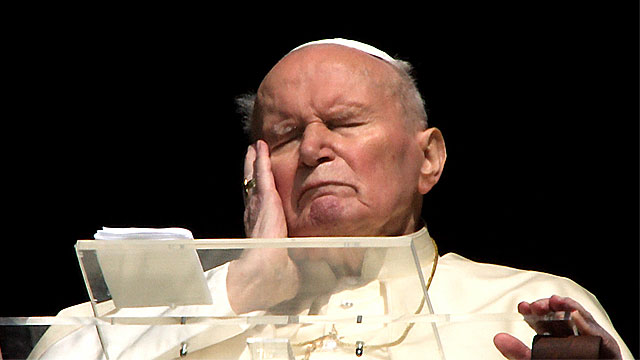
Written by Sr. Nuala Kenny, SC, MD, OC, FRCP
Sr. Nuala Kenny is a Sister of Charity of Halifax, Medical Doctor, ethicist and author. See her previous interview with Salt and Light Television.
“For it is not as if we had a high priest who was incapable of feeling our weakness with us; but we have one who has been tempted in every way that we are, though he is without sin.”
(Hebrews 4: 15)
The experiences of serious, life-threatening and terminal illness and of dying are times of profound challenges for patients, their loved ones, and their care-givers. Persons of faith experience the same physical and psychological distress as others but faith can be a deep source of comfort, strength and meaning. Christian spirituality is rooted in our relationship to a God who so loved us that He sent His only Son to suffer and die for us. We have a “high priest who knows our weakness.” In sacrificing Himself, Jesus gave a new meaning to sickness, dying and all human suffering.
In today’s death-denying, death-defying world suffering is to be avoided at all cost, even to the point of physician assisted death. We need to be clear that euthanasia and assisted suicide are direct contradictions of the central Christian belief in the Paschal Mystery, the passion, death and resurrection of Jesus Christ. In our time we need to retrieve the insights, solace, and strength found in the tradition of The Way of the Cross.
We begin our journey in the Garden of Gethsemane where Jesus prays:
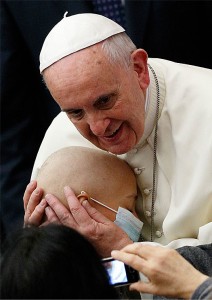 “‘Father’ he said, ‘if you are willing, take this cup away from me. Nevertheless, let your will be done, not mine’…In anguish he prayed even more earnestly, and sweat fell to the ground like great drops of blood” (Luke 22:42-44)
We see Jesus in great fear and anguish as He experiences the natural human desire to avoid pain and suffering. He knows that incredibly difficult and painful things will be asked of Him in the days to come. The anticipation and uncertainty of it are overwhelming. Jesus is not yet experiencing physical pain but He is already the Suffering Servant experiencing emotional, psychological and spiritual challenges. After much prayer He comes to accept that He must trust absolutely in the Father’s care and plan for him.
Reflection: Can you see and feel Jesus’ fear of pain and suffering? Can you understand it from your own experience?
In this difficult time Jesus needs the support of his friends more than ever but,
“When he rose from prayer he went to the disciples and found them sleeping for sheer grief. ’Why are you asleep? Get up and pray not to be put to the test.” (Matthew 22:45-46)
Jesus final moments with his disciples are marked not by support but by terrifying isolation and even denial by Judas and Peter. Fear of abandonment in time of need compounds his suffering. But trusting in the will of the Father, He sets out on The Way to the Cross.
Reflection: Can you imagine Jesus’ feelings of isolation? Have you felt abandoned in suffering or have you abandoned your loved ones in their pain and suffering?
“‘Father’ he said, ‘if you are willing, take this cup away from me. Nevertheless, let your will be done, not mine’…In anguish he prayed even more earnestly, and sweat fell to the ground like great drops of blood” (Luke 22:42-44)
We see Jesus in great fear and anguish as He experiences the natural human desire to avoid pain and suffering. He knows that incredibly difficult and painful things will be asked of Him in the days to come. The anticipation and uncertainty of it are overwhelming. Jesus is not yet experiencing physical pain but He is already the Suffering Servant experiencing emotional, psychological and spiritual challenges. After much prayer He comes to accept that He must trust absolutely in the Father’s care and plan for him.
Reflection: Can you see and feel Jesus’ fear of pain and suffering? Can you understand it from your own experience?
In this difficult time Jesus needs the support of his friends more than ever but,
“When he rose from prayer he went to the disciples and found them sleeping for sheer grief. ’Why are you asleep? Get up and pray not to be put to the test.” (Matthew 22:45-46)
Jesus final moments with his disciples are marked not by support but by terrifying isolation and even denial by Judas and Peter. Fear of abandonment in time of need compounds his suffering. But trusting in the will of the Father, He sets out on The Way to the Cross.
Reflection: Can you imagine Jesus’ feelings of isolation? Have you felt abandoned in suffering or have you abandoned your loved ones in their pain and suffering?
 Station 1: Jesus is condemned to die
Leader: We adore you O Christ and we praise you,
Response: Because by your holy cross and resurrection you have redeemed the world.
“When morning came, all the chief priests and elders of the people met in council to bring about the death of Jesus. They had him bound, and led him away to hand him over to Pilate, the governor... He ordered Jesus to be first scourged and then handed over to be crucified.” (Matt. 27:1, 26)
Pilate acknowledges that Jesus is innocent but he still orders Him to be captured and condemned. The anticipation of painful things is now a reality. Jesus now experiences uncertainty regarding what scourging and crucifixion will require of Him and fear of dying. Though physically bound, He maintains a dignity and serenity and freely surrenders to what is to come.
We too can be ‘captured’ by the diagnosis of a life-altering or terminal medical condition. It can overwhelm our life and occupy all our attention. We ask “Why me?” or “Why my son or daughter or spouse or friend?” It changes our perspective on everything.
Reflection: Can Jesus’ response give meaning and consolation if you or a loved one are ‘captured’ by the diagnosis of a life threatening or terminal illness?
Station 1: Jesus is condemned to die
Leader: We adore you O Christ and we praise you,
Response: Because by your holy cross and resurrection you have redeemed the world.
“When morning came, all the chief priests and elders of the people met in council to bring about the death of Jesus. They had him bound, and led him away to hand him over to Pilate, the governor... He ordered Jesus to be first scourged and then handed over to be crucified.” (Matt. 27:1, 26)
Pilate acknowledges that Jesus is innocent but he still orders Him to be captured and condemned. The anticipation of painful things is now a reality. Jesus now experiences uncertainty regarding what scourging and crucifixion will require of Him and fear of dying. Though physically bound, He maintains a dignity and serenity and freely surrenders to what is to come.
We too can be ‘captured’ by the diagnosis of a life-altering or terminal medical condition. It can overwhelm our life and occupy all our attention. We ask “Why me?” or “Why my son or daughter or spouse or friend?” It changes our perspective on everything.
Reflection: Can Jesus’ response give meaning and consolation if you or a loved one are ‘captured’ by the diagnosis of a life threatening or terminal illness?
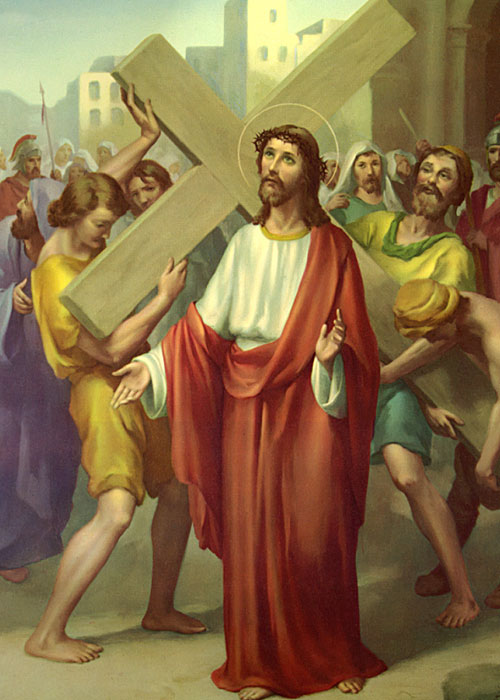 Station 2: Jesus takes up His cross
Leader: We adore you O Christ and we praise you,
Response: Because by your holy cross and resurrection you have redeemed the world.
“Then they took charge of Jesus, and carrying his own cross he went out of the city to a place of the skull or, as it was called in Hebrew Golgotha…” (John 19: 17)
Since His baptism, the first miracle at Cana, and His declaration in the synagogue in Nazareth that the reading from the prophet Isaiah regarding the blind seeing, the oppressed going free and the good news to the poor has been fulfilled, Jesus has had a growing sense of who He is. He has confidently called God Abba, Father. But here Jesus, the popular healer, the “well-beloved Son,” is a condemned criminal and an outcast who takes up a cross.
Loss of identity can be experienced by all who have serious and chronic illness or disability and those who are dying. Our physical appearance can be profoundly altered; the talents and abilities in which we took pride lost and our role in our families, work and communities unalterably compromised. We can feel that we are truly falling apart.
Reflection: Can you enter into Jesus’ experience of loss of affirmation and acceptance and loss of identity and purpose in life?
Station 2: Jesus takes up His cross
Leader: We adore you O Christ and we praise you,
Response: Because by your holy cross and resurrection you have redeemed the world.
“Then they took charge of Jesus, and carrying his own cross he went out of the city to a place of the skull or, as it was called in Hebrew Golgotha…” (John 19: 17)
Since His baptism, the first miracle at Cana, and His declaration in the synagogue in Nazareth that the reading from the prophet Isaiah regarding the blind seeing, the oppressed going free and the good news to the poor has been fulfilled, Jesus has had a growing sense of who He is. He has confidently called God Abba, Father. But here Jesus, the popular healer, the “well-beloved Son,” is a condemned criminal and an outcast who takes up a cross.
Loss of identity can be experienced by all who have serious and chronic illness or disability and those who are dying. Our physical appearance can be profoundly altered; the talents and abilities in which we took pride lost and our role in our families, work and communities unalterably compromised. We can feel that we are truly falling apart.
Reflection: Can you enter into Jesus’ experience of loss of affirmation and acceptance and loss of identity and purpose in life?
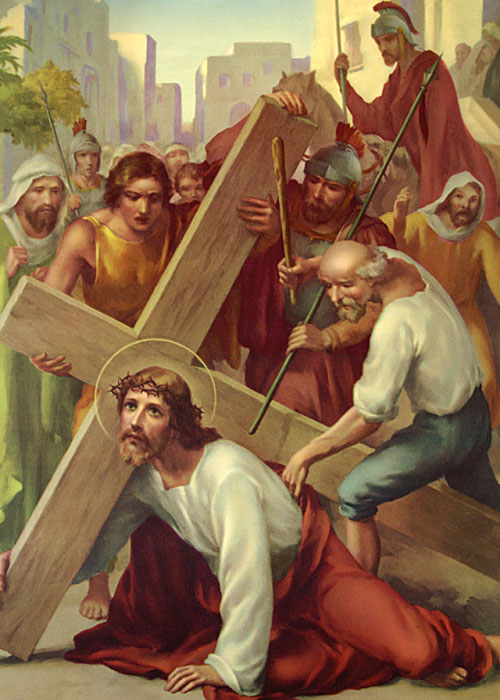 Station 3: Jesus falls the first time
Leader: We adore you O Christ and we praise you,
Response: Because by your holy cross and resurrection you have redeemed the world.
While there is no scriptural basis for the three falls of Christ, tradition recognizes in the falls the threefold nature of human suffering: physical, psychological and spiritual. In the first fall, the Christian imagination recognizes the sheer physical burden Jesus experienced in carrying a heavy rough cross after an emotionally exhausting period of betrayal, imprisonment and judgment. Though He was a young man used to hard labor, He can no longer rely on physical strength.
We know that patients become exhausted by pain, suffering and the experience of mounting losses. While there are different abilities for coping, illness can bring us physical falls as well as a deeper, overwhelming feeling of ‘staggering’ or ‘reeling’ on the constantly shifting ground of serious illness and dying
Reflection: Can you recall a time in your life when, like Jesus, you have fallen from shear fatigue and weakness?
Station 3: Jesus falls the first time
Leader: We adore you O Christ and we praise you,
Response: Because by your holy cross and resurrection you have redeemed the world.
While there is no scriptural basis for the three falls of Christ, tradition recognizes in the falls the threefold nature of human suffering: physical, psychological and spiritual. In the first fall, the Christian imagination recognizes the sheer physical burden Jesus experienced in carrying a heavy rough cross after an emotionally exhausting period of betrayal, imprisonment and judgment. Though He was a young man used to hard labor, He can no longer rely on physical strength.
We know that patients become exhausted by pain, suffering and the experience of mounting losses. While there are different abilities for coping, illness can bring us physical falls as well as a deeper, overwhelming feeling of ‘staggering’ or ‘reeling’ on the constantly shifting ground of serious illness and dying
Reflection: Can you recall a time in your life when, like Jesus, you have fallen from shear fatigue and weakness?
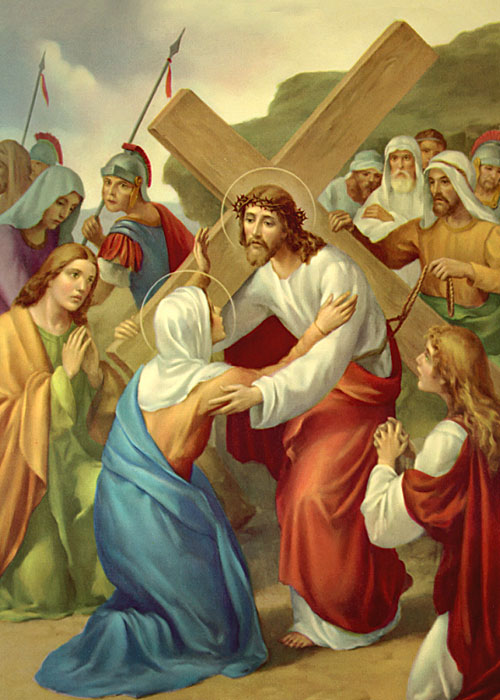 Station 4: Jesus meets his mother
Leader: We adore you O Christ and we praise you,
Response: Because by your holy cross and resurrection you have redeemed the world.
“Seeing his mother and the disciple he loved standing near her, Jesus said to his mother, ”Woman, this is your son.” Then to the disciple he said, “This is your mother.” And from that moment the disciple made a place for her in his home.” (John 19:26-27)
Mary, the Mother of Sorrows, accompanies Jesus at a distance throughout his ordeal. Mary, who said the great “yes” to the Father, ponders the meaning in what is happening to her beloved Son. She remains faithful even when there are no easy answers and brings the gift of her presence. On Calvary just before the end, Jesus ensures Mary will be cared for after He is gone.
Both the sick and dying and their loved ones are grieving and trying to find meaning in it all. The simple presence of loved ones is essential. Being able to leave others and to give permission for others to go is crucial. Acceptance of dying allows the precious grace of time for completing the goodbyes, forgiveness, expressions of love and gratitude and reconciliation
Reflection: Imagine the indescribable pain and loss of both Jesus and Mary throughout the passion. How do they help you deal with significant relationships in your life that will be extremely difficult to let go at the end?
Station 4: Jesus meets his mother
Leader: We adore you O Christ and we praise you,
Response: Because by your holy cross and resurrection you have redeemed the world.
“Seeing his mother and the disciple he loved standing near her, Jesus said to his mother, ”Woman, this is your son.” Then to the disciple he said, “This is your mother.” And from that moment the disciple made a place for her in his home.” (John 19:26-27)
Mary, the Mother of Sorrows, accompanies Jesus at a distance throughout his ordeal. Mary, who said the great “yes” to the Father, ponders the meaning in what is happening to her beloved Son. She remains faithful even when there are no easy answers and brings the gift of her presence. On Calvary just before the end, Jesus ensures Mary will be cared for after He is gone.
Both the sick and dying and their loved ones are grieving and trying to find meaning in it all. The simple presence of loved ones is essential. Being able to leave others and to give permission for others to go is crucial. Acceptance of dying allows the precious grace of time for completing the goodbyes, forgiveness, expressions of love and gratitude and reconciliation
Reflection: Imagine the indescribable pain and loss of both Jesus and Mary throughout the passion. How do they help you deal with significant relationships in your life that will be extremely difficult to let go at the end?
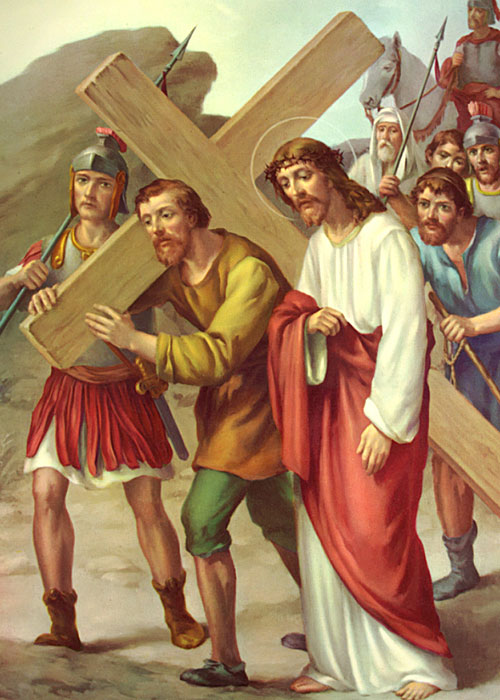 Station 5: Simon of Cyrene helps Jesus to carry his cross
Leader: We adore you O Christ and we praise you,
Response: Because by your holy cross and resurrection you have redeemed the world.
“On their way out, they came across a man from Cyrene, Simon by name, and enlisted him to carry his cross” (Matt. 27:32).
The soldiers, recognizing the difficulty Jesus was experiencing in carrying the cross, enlist a passer-by to help. And Jesus becomes publicly dependent on the help of another. Simon does not volunteer to assist the struggling Jesus but is “enlisted” and forced to help. It is unclear how willingly or reluctantly he took up the cross of Christ.
In our culture today the loss of independence is intolerable. Being free to choose and act as we desire is highly valued and dependence is to be avoided at all cost. When circumstances such as serious illness and dying force our dependence on others we experience it as being a burden. We all need help and companionship in serious illness and in dying.
Reflection: Can you be with Jesus in His acceptance of dependence on another, perhaps one who is helping grudgingly? How does His experience help you to give and receive help?
Station 5: Simon of Cyrene helps Jesus to carry his cross
Leader: We adore you O Christ and we praise you,
Response: Because by your holy cross and resurrection you have redeemed the world.
“On their way out, they came across a man from Cyrene, Simon by name, and enlisted him to carry his cross” (Matt. 27:32).
The soldiers, recognizing the difficulty Jesus was experiencing in carrying the cross, enlist a passer-by to help. And Jesus becomes publicly dependent on the help of another. Simon does not volunteer to assist the struggling Jesus but is “enlisted” and forced to help. It is unclear how willingly or reluctantly he took up the cross of Christ.
In our culture today the loss of independence is intolerable. Being free to choose and act as we desire is highly valued and dependence is to be avoided at all cost. When circumstances such as serious illness and dying force our dependence on others we experience it as being a burden. We all need help and companionship in serious illness and in dying.
Reflection: Can you be with Jesus in His acceptance of dependence on another, perhaps one who is helping grudgingly? How does His experience help you to give and receive help?
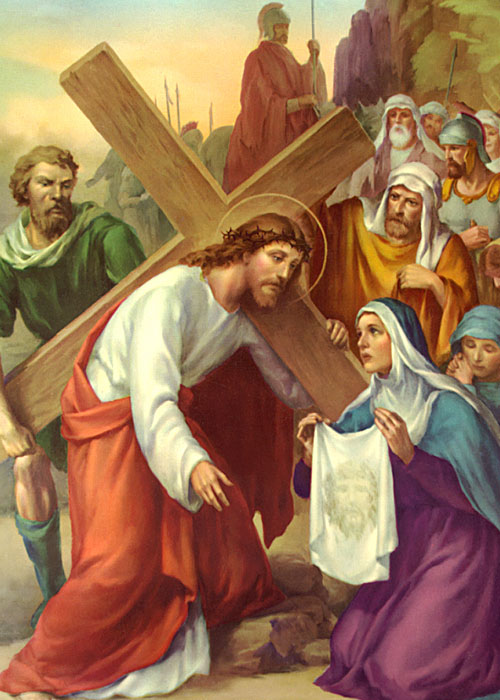 Station 6: Veronica Wipes the Face of Jesus
Leader: We adore you O Christ and we praise you,
Response: Because by your holy cross and resurrection you have redeemed the world.
“There were some women watching from a distance…these used to follow him and look after him when he was in Galilee. And there were many other women there who had come up to Jerusalem with him.” (Mark 15:40-41)
Veronica was one of the faithful women who followed Jesus at a distance. She had a personal relationship with Jesus long before she reaches out to Him here. This relationship enables her to risk punishment in order to be a loving presence when He needs her compassionate care.
Sometimes we look on the suffering and distress of loved ones but don’t reach out to offer help even in small ways that matter.
Reflection: Where does Veronica get the courage to comfort and care even at personal risk? How can we learn such courage?
Station 6: Veronica Wipes the Face of Jesus
Leader: We adore you O Christ and we praise you,
Response: Because by your holy cross and resurrection you have redeemed the world.
“There were some women watching from a distance…these used to follow him and look after him when he was in Galilee. And there were many other women there who had come up to Jerusalem with him.” (Mark 15:40-41)
Veronica was one of the faithful women who followed Jesus at a distance. She had a personal relationship with Jesus long before she reaches out to Him here. This relationship enables her to risk punishment in order to be a loving presence when He needs her compassionate care.
Sometimes we look on the suffering and distress of loved ones but don’t reach out to offer help even in small ways that matter.
Reflection: Where does Veronica get the courage to comfort and care even at personal risk? How can we learn such courage?
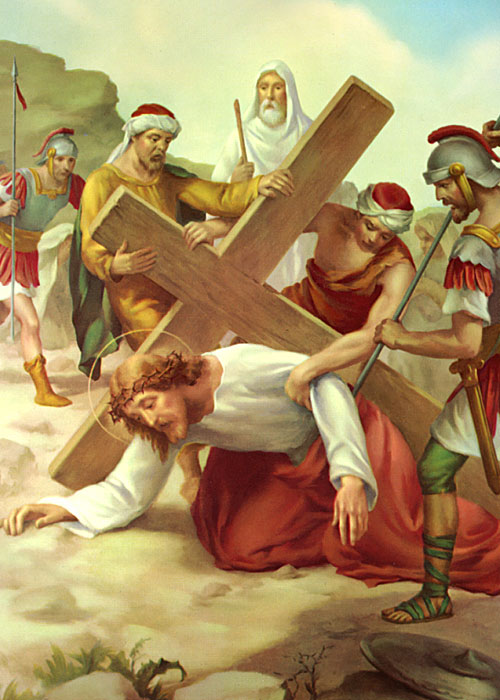 Station 7: Jesus falls the second time
Leader: We adore you O Christ and we praise you,
Response: Because by your holy cross and resurrection you have redeemed the world.
The second fall recognizes Jesus’ experience of psychological and emotional suffering. This time He must have feared that He could not get up again; that it was hopeless. But Jesus shows complete trust in the Father’s care and plan for Him despite public humiliation and the apparent failure of His earthly mission.
Hope often arises in situations that are overwhelming. In terminal illness there is first a hope for cure or that the doctors were wrong. But there is an ambiguity in hope. What should we hope for? There can be a ‘tyranny of hope” which forces us to look for any option that would change the future rather than to accept the present reality.
Reflection: What can we know of Jesus’ fundamental vision of God in His rising from another fall and hoping in a seemingly hopeless situation?
Station 7: Jesus falls the second time
Leader: We adore you O Christ and we praise you,
Response: Because by your holy cross and resurrection you have redeemed the world.
The second fall recognizes Jesus’ experience of psychological and emotional suffering. This time He must have feared that He could not get up again; that it was hopeless. But Jesus shows complete trust in the Father’s care and plan for Him despite public humiliation and the apparent failure of His earthly mission.
Hope often arises in situations that are overwhelming. In terminal illness there is first a hope for cure or that the doctors were wrong. But there is an ambiguity in hope. What should we hope for? There can be a ‘tyranny of hope” which forces us to look for any option that would change the future rather than to accept the present reality.
Reflection: What can we know of Jesus’ fundamental vision of God in His rising from another fall and hoping in a seemingly hopeless situation?
 Station 8: Jesus consoles the weeping women of Jerusalem
Leader: We adore you O Christ and we praise you,
Response: Because by your holy cross and resurrection you have redeemed the world.
“Large numbers of people followed him, and of women too, who mourned and lamented for him. But Jesus turned to them and said, “Daughters of Jerusalem, do not weep for me; weep rather for yourselves and for your children.” (Luke 23”27-28)
Even in the midst of agony, Jesus reaches out to others. He acknowledges the grief and pain of the women who have been faithful followers. And even nailed to the cross at the very end He recognizes and rewards the faith of the good thief.
Illness isolates us. Physical symptoms and fear and depression can make us focused inward; obsessed with our painful experience and incapable of caring relationships.
Reflection: How was Jesus able to offer compassion to others, especially when His own life was threatened? Does the suffering of Jesus help you to understand and respond to the suffering of others?
Station 8: Jesus consoles the weeping women of Jerusalem
Leader: We adore you O Christ and we praise you,
Response: Because by your holy cross and resurrection you have redeemed the world.
“Large numbers of people followed him, and of women too, who mourned and lamented for him. But Jesus turned to them and said, “Daughters of Jerusalem, do not weep for me; weep rather for yourselves and for your children.” (Luke 23”27-28)
Even in the midst of agony, Jesus reaches out to others. He acknowledges the grief and pain of the women who have been faithful followers. And even nailed to the cross at the very end He recognizes and rewards the faith of the good thief.
Illness isolates us. Physical symptoms and fear and depression can make us focused inward; obsessed with our painful experience and incapable of caring relationships.
Reflection: How was Jesus able to offer compassion to others, especially when His own life was threatened? Does the suffering of Jesus help you to understand and respond to the suffering of others?
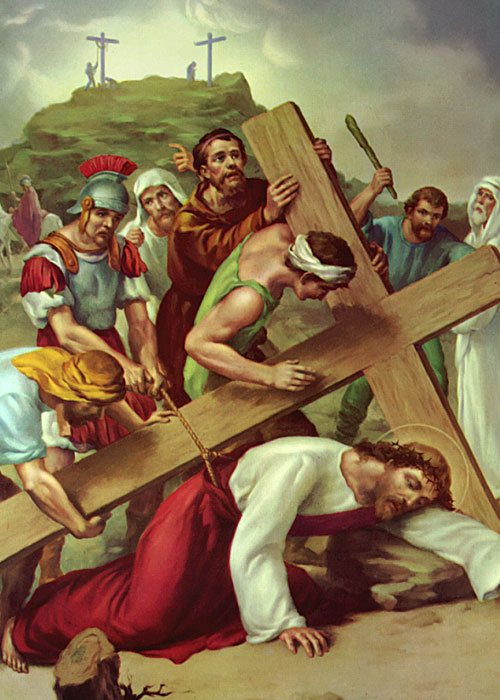 Station 9: Jesus falls for the third time
Leader: We adore you O Christ and we praise you,
Response: Because by your holy cross and resurrection you have redeemed the world.
This third and final fall recognizes the spiritual suffering of Jesus. In many ways spiritual suffering is the worst. This time it is almost impossible for Jesus to get up and continue. This suffering is rooted in Jesus’ need to find meaning in apparent failure of His ministry and in the human temptation to despair. It is directly related to Jesus’ faith in God as loving Father.
Today, we lack a language for spiritual suffering. Medicine can give great assistance to pain and other physical distress of the sick and the dying but there is no prescription for spiritual suffering. Finding meaning in the reality of pain and suffering is the most important challenge in dying. For the dying and the grieving transforming the reality of pain and suffering requires faith.
Reflection: Can we be with Jesus as He grapples with the meaning of His passion? What can we learn about suffering as a sacred challenge when we are tempted to give up and give in to despair?
Station 9: Jesus falls for the third time
Leader: We adore you O Christ and we praise you,
Response: Because by your holy cross and resurrection you have redeemed the world.
This third and final fall recognizes the spiritual suffering of Jesus. In many ways spiritual suffering is the worst. This time it is almost impossible for Jesus to get up and continue. This suffering is rooted in Jesus’ need to find meaning in apparent failure of His ministry and in the human temptation to despair. It is directly related to Jesus’ faith in God as loving Father.
Today, we lack a language for spiritual suffering. Medicine can give great assistance to pain and other physical distress of the sick and the dying but there is no prescription for spiritual suffering. Finding meaning in the reality of pain and suffering is the most important challenge in dying. For the dying and the grieving transforming the reality of pain and suffering requires faith.
Reflection: Can we be with Jesus as He grapples with the meaning of His passion? What can we learn about suffering as a sacred challenge when we are tempted to give up and give in to despair?
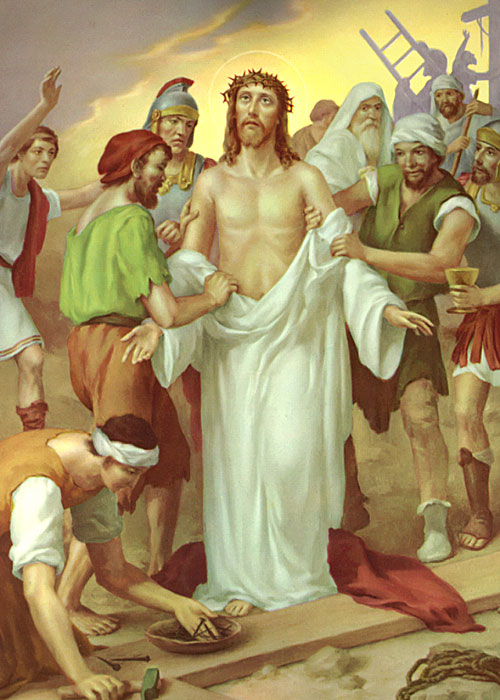 Station 10: Jesus is stripped of His garments
Leader: We adore you O Christ and we praise you,
Response: Because by your holy cross and resurrection you have redeemed the world.
“They dressed him up in purple, twisted some thorns into a crown and put it on him; and they went down on their knees to do him homage. And when they had finished making fun of him, they took off the purple and dressed him in his own clothes.”
(Mark 15:1-20)
Jesus experienced profound degradation and humiliation during His ordeal. He was physically disfigured; taunted for His weakness; and derided for His failure to accomplish for Himself the freedom from bondage He had done for others.
Feelings of loss of dignity are common in serious illness and dying, especially when patients need help with intimate care needs and experience profound alterations in their appearance and abilities. One of the major reasons persons request assisted death is their loss of a sense of dignity. While there is much discussion about ‘death with dignity’ being about control, we know that dignity is an inherent quality of the children of God, not an attribute lost in weakness.
Reflection: Can you empathize with Jesus in His experience of being humiliated? What do you want to say to Him? When you see a loved one experiencing a sense of loss of dignity in illness, what do you want to say to them?
Station 10: Jesus is stripped of His garments
Leader: We adore you O Christ and we praise you,
Response: Because by your holy cross and resurrection you have redeemed the world.
“They dressed him up in purple, twisted some thorns into a crown and put it on him; and they went down on their knees to do him homage. And when they had finished making fun of him, they took off the purple and dressed him in his own clothes.”
(Mark 15:1-20)
Jesus experienced profound degradation and humiliation during His ordeal. He was physically disfigured; taunted for His weakness; and derided for His failure to accomplish for Himself the freedom from bondage He had done for others.
Feelings of loss of dignity are common in serious illness and dying, especially when patients need help with intimate care needs and experience profound alterations in their appearance and abilities. One of the major reasons persons request assisted death is their loss of a sense of dignity. While there is much discussion about ‘death with dignity’ being about control, we know that dignity is an inherent quality of the children of God, not an attribute lost in weakness.
Reflection: Can you empathize with Jesus in His experience of being humiliated? What do you want to say to Him? When you see a loved one experiencing a sense of loss of dignity in illness, what do you want to say to them?
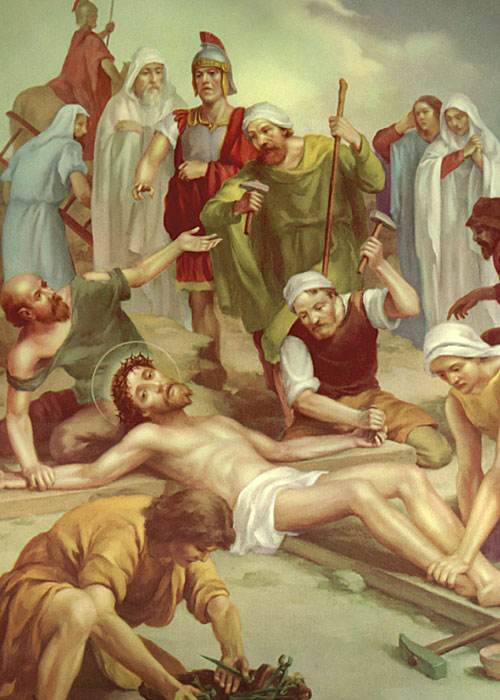 Station 11: Jesus is nailed to the cross
Leader: We adore you O Christ and we praise you,
Response: Because by your holy cross and resurrection you have redeemed the world.
“My God, my God, why have you deserted me?” (Matt. 27:46)
Nailed to the cross and in great pain, Jesus has lost all control over events. In anguish He cries out His feelings of abandonment even by the Father. His sense of failure in achieving the mission entrusted to Him is compounded by a sense that the Father has failed to protect Him.
“When they reached the place called The Skull, they crucified him there and the two criminals also, one on the right and one on the left. Jesus said, “Father, forgive them for they do not know what they are doing.” (Luke 23:33-34).
But even now, Jesus is full of forgiveness for those who crucify Him and totally trusting in the love and mercy of the Father.
In serious illness, especially when accompanied by pain and other physical symptoms, our sense of abandonment can be overwhelming and our faith and trust in a loving God can be sorely tested. How can a loving God allow such suffering?
Reflection: What do we hear in Jesus’ cry to the Father? When you experience a loss of control and feel abandoned and deserted, what is your deepest cry to God?
Station 11: Jesus is nailed to the cross
Leader: We adore you O Christ and we praise you,
Response: Because by your holy cross and resurrection you have redeemed the world.
“My God, my God, why have you deserted me?” (Matt. 27:46)
Nailed to the cross and in great pain, Jesus has lost all control over events. In anguish He cries out His feelings of abandonment even by the Father. His sense of failure in achieving the mission entrusted to Him is compounded by a sense that the Father has failed to protect Him.
“When they reached the place called The Skull, they crucified him there and the two criminals also, one on the right and one on the left. Jesus said, “Father, forgive them for they do not know what they are doing.” (Luke 23:33-34).
But even now, Jesus is full of forgiveness for those who crucify Him and totally trusting in the love and mercy of the Father.
In serious illness, especially when accompanied by pain and other physical symptoms, our sense of abandonment can be overwhelming and our faith and trust in a loving God can be sorely tested. How can a loving God allow such suffering?
Reflection: What do we hear in Jesus’ cry to the Father? When you experience a loss of control and feel abandoned and deserted, what is your deepest cry to God?
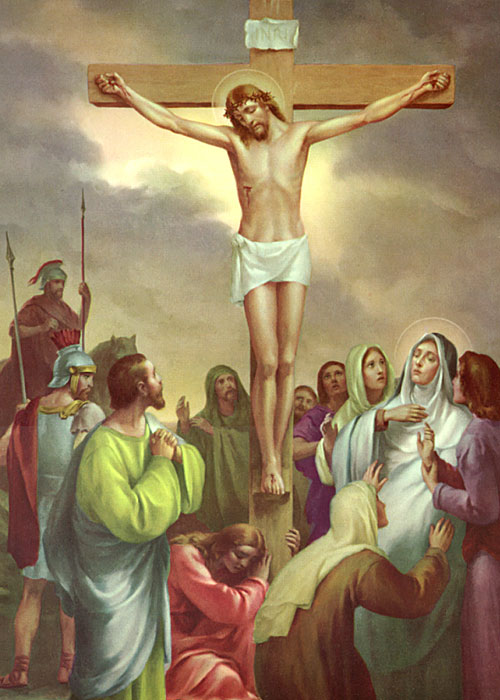 Station 12: Jesus dies
Leader: We adore you O Christ and we praise you,
Response: Because by your holy cross and resurrection you have redeemed the world.
“Father, into your hands I commend my spirit. With these words he breathed his last. (Luke 23:46)
In the Old Testament, death is personified as the enemy. It is associated with descent into the ultimate darkness where there is no joy, no hope and total isolation. As Jesus experiences death, He remains firm in His trust in the Father. He freely lays down his life for others because for Him, death is not the enemy.
For loved ones and caregivers, the moment of death is both a biological event and a sacred mystery. It is the finality of our life on earth. It can be terrifying for some and a moment of overwhelming peace and gratitude for others even in the midst of sadness and loss. For Christians it is also a deeply personal and transformative act that ends earthly life and fulfills it; not just a passive event.
Reflection: Can you immerse yourself in these final moments of Jesus’ life and find strength and solace from His generosity and trust in the Father?
Station 12: Jesus dies
Leader: We adore you O Christ and we praise you,
Response: Because by your holy cross and resurrection you have redeemed the world.
“Father, into your hands I commend my spirit. With these words he breathed his last. (Luke 23:46)
In the Old Testament, death is personified as the enemy. It is associated with descent into the ultimate darkness where there is no joy, no hope and total isolation. As Jesus experiences death, He remains firm in His trust in the Father. He freely lays down his life for others because for Him, death is not the enemy.
For loved ones and caregivers, the moment of death is both a biological event and a sacred mystery. It is the finality of our life on earth. It can be terrifying for some and a moment of overwhelming peace and gratitude for others even in the midst of sadness and loss. For Christians it is also a deeply personal and transformative act that ends earthly life and fulfills it; not just a passive event.
Reflection: Can you immerse yourself in these final moments of Jesus’ life and find strength and solace from His generosity and trust in the Father?
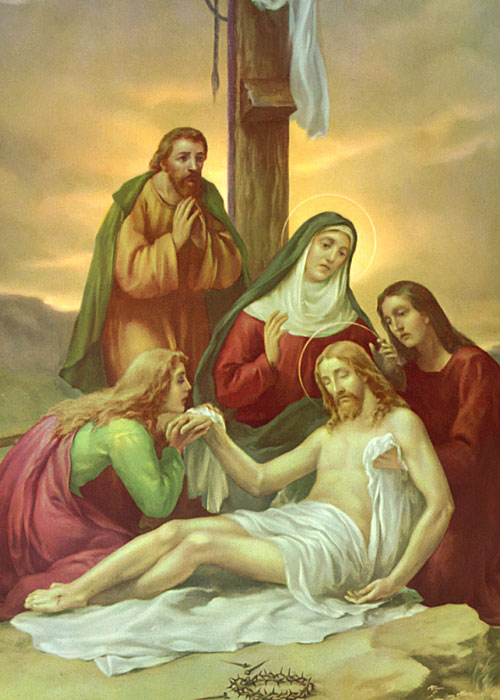 Station 13: Jesus is taken down from the cross
“It is accomplished.” (John: 19:30)
Leader: We adore you O Christ and we praise you,
Response: Because by your holy cross and resurrection you have redeemed the world.
This has been a long physical, emotional and spiritual ordeal in which it appears that the apostles failed Jesus, Jesus failed the Father, and the Father failed to save Jesus. There was no easy out. But we know that the cross, a radical symbol of failure, has been transformed into a symbol of love and life. Jesus endured radical and humiliating failure but through it He did accomplish our salvation!
Our own experience at the death of a loved one is complex. There was no miracle cure. There may be a numbness from the sheer intensity of the dying and a deep sense of loss and disorientation. In some circumstances, amidst the sadness, there is relief that it the pain and suffering are over and a consolation that the loved one is now at peace with God.
Reflection: What do you want to say to Jesus’? What does His death tell us of the meaning of a good death for ourselves and our loved ones?
Station 13: Jesus is taken down from the cross
“It is accomplished.” (John: 19:30)
Leader: We adore you O Christ and we praise you,
Response: Because by your holy cross and resurrection you have redeemed the world.
This has been a long physical, emotional and spiritual ordeal in which it appears that the apostles failed Jesus, Jesus failed the Father, and the Father failed to save Jesus. There was no easy out. But we know that the cross, a radical symbol of failure, has been transformed into a symbol of love and life. Jesus endured radical and humiliating failure but through it He did accomplish our salvation!
Our own experience at the death of a loved one is complex. There was no miracle cure. There may be a numbness from the sheer intensity of the dying and a deep sense of loss and disorientation. In some circumstances, amidst the sadness, there is relief that it the pain and suffering are over and a consolation that the loved one is now at peace with God.
Reflection: What do you want to say to Jesus’? What does His death tell us of the meaning of a good death for ourselves and our loved ones?
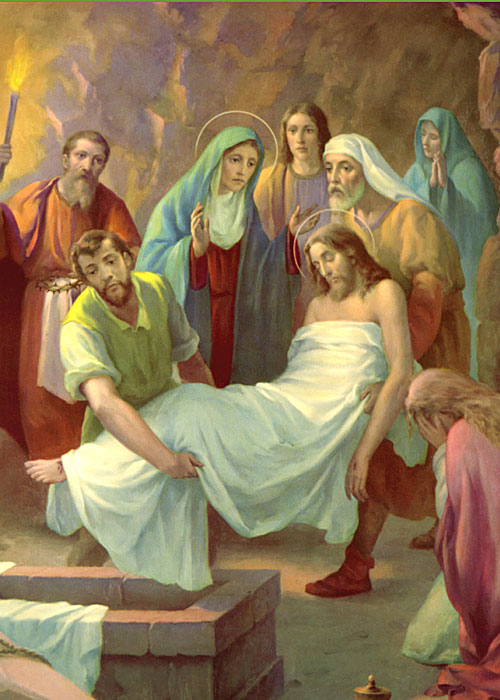 Station 14: Jesus is laid in the tomb
Leader: We adore you O Christ and we praise you,
Response: Because by your holy cross and resurrection you have redeemed the world.
“When it was evening, there came a rich man of Arimathea, called Joseph, who had himself become a disciple of Jesus. The man went to Pilate and asked for the body of Jesus. Thereupon, Pilate ordered it to be handed over. So Joseph took the body, wrapped it in a clean shroud and put it in his own new tomb which he had hewn from a rock. He then rolled a large stone across the entrance of the tomb and went away” (Matt 27:57-61).
Jesus has died but the grieving and bereavement of loved ones has just begun. The rituals of burial become extremely important to the followers of Jesus not only to show their love and respect but to help them come to grips with their loss. The rituals help carry the bereaved forward when they experience the paralysis of grief and loss as do our own Christian rituals.
We need to reflect on our wishes for after our death and convey them in wills and letters to loved ones. In our time many have avoided rituals of death and burial wanting to get it ‘over with’ soon after the death. Our faith and burial rites remind us that there is more to life than death.
Reflection: Can you identify with the grief and loss of the followers of Jesus? What experiences of funeral and burials have helped you in your bereavement?
Jesus Rises from the Dead
“On the first day of the week, at the first sign of dawn, they went to the tomb with the spices they had prepared. They found that the stone had been rolled away from the tomb but on entering discovered that the body of the Lord Jesus was not there. As they stood there not knowing what to think, two men in brilliant clothes suddenly appeared at their side .Terrified, the women lowered their eyes. But the two men said to them, “Why are you looking among the dead for someone who is alive?
He is not here; he has risen.” (Luke 24:1-6)
History can verify that Jesus died but only faith recognizes the Resurrection. There are different responses to the Resurrection: the joyful women; the amazed Peter and John who run to the tomb; and the doubtful Thomas who needs proof of real physical contact.
We still get sick and die but Jesus has conquered all of these. Through His suffering, He shows us the way, He teaches us the truth, and His offers us life eternal.
Jesus’ message to the disciples was “Do not be afraid!” Seeing the risen Christ confirms the hope and the light after the darkness of the passion and death. The personal experience of the resurrection convinces the disciples that death has not triumphed or ended their real and still living relationship with the Lord. This is the clear insight that life is changed, not ended.
Reflection: How do you respond to the Resurrection? How do you respond to Jesus’ message to be unafraid of suffering and death? How should you?
Station 14: Jesus is laid in the tomb
Leader: We adore you O Christ and we praise you,
Response: Because by your holy cross and resurrection you have redeemed the world.
“When it was evening, there came a rich man of Arimathea, called Joseph, who had himself become a disciple of Jesus. The man went to Pilate and asked for the body of Jesus. Thereupon, Pilate ordered it to be handed over. So Joseph took the body, wrapped it in a clean shroud and put it in his own new tomb which he had hewn from a rock. He then rolled a large stone across the entrance of the tomb and went away” (Matt 27:57-61).
Jesus has died but the grieving and bereavement of loved ones has just begun. The rituals of burial become extremely important to the followers of Jesus not only to show their love and respect but to help them come to grips with their loss. The rituals help carry the bereaved forward when they experience the paralysis of grief and loss as do our own Christian rituals.
We need to reflect on our wishes for after our death and convey them in wills and letters to loved ones. In our time many have avoided rituals of death and burial wanting to get it ‘over with’ soon after the death. Our faith and burial rites remind us that there is more to life than death.
Reflection: Can you identify with the grief and loss of the followers of Jesus? What experiences of funeral and burials have helped you in your bereavement?
Jesus Rises from the Dead
“On the first day of the week, at the first sign of dawn, they went to the tomb with the spices they had prepared. They found that the stone had been rolled away from the tomb but on entering discovered that the body of the Lord Jesus was not there. As they stood there not knowing what to think, two men in brilliant clothes suddenly appeared at their side .Terrified, the women lowered their eyes. But the two men said to them, “Why are you looking among the dead for someone who is alive?
He is not here; he has risen.” (Luke 24:1-6)
History can verify that Jesus died but only faith recognizes the Resurrection. There are different responses to the Resurrection: the joyful women; the amazed Peter and John who run to the tomb; and the doubtful Thomas who needs proof of real physical contact.
We still get sick and die but Jesus has conquered all of these. Through His suffering, He shows us the way, He teaches us the truth, and His offers us life eternal.
Jesus’ message to the disciples was “Do not be afraid!” Seeing the risen Christ confirms the hope and the light after the darkness of the passion and death. The personal experience of the resurrection convinces the disciples that death has not triumphed or ended their real and still living relationship with the Lord. This is the clear insight that life is changed, not ended.
Reflection: How do you respond to the Resurrection? How do you respond to Jesus’ message to be unafraid of suffering and death? How should you?
 “‘Father’ he said, ‘if you are willing, take this cup away from me. Nevertheless, let your will be done, not mine’…In anguish he prayed even more earnestly, and sweat fell to the ground like great drops of blood” (Luke 22:42-44)
We see Jesus in great fear and anguish as He experiences the natural human desire to avoid pain and suffering. He knows that incredibly difficult and painful things will be asked of Him in the days to come. The anticipation and uncertainty of it are overwhelming. Jesus is not yet experiencing physical pain but He is already the Suffering Servant experiencing emotional, psychological and spiritual challenges. After much prayer He comes to accept that He must trust absolutely in the Father’s care and plan for him.
Reflection: Can you see and feel Jesus’ fear of pain and suffering? Can you understand it from your own experience?
In this difficult time Jesus needs the support of his friends more than ever but,
“When he rose from prayer he went to the disciples and found them sleeping for sheer grief. ’Why are you asleep? Get up and pray not to be put to the test.” (Matthew 22:45-46)
Jesus final moments with his disciples are marked not by support but by terrifying isolation and even denial by Judas and Peter. Fear of abandonment in time of need compounds his suffering. But trusting in the will of the Father, He sets out on The Way to the Cross.
Reflection: Can you imagine Jesus’ feelings of isolation? Have you felt abandoned in suffering or have you abandoned your loved ones in their pain and suffering?
“‘Father’ he said, ‘if you are willing, take this cup away from me. Nevertheless, let your will be done, not mine’…In anguish he prayed even more earnestly, and sweat fell to the ground like great drops of blood” (Luke 22:42-44)
We see Jesus in great fear and anguish as He experiences the natural human desire to avoid pain and suffering. He knows that incredibly difficult and painful things will be asked of Him in the days to come. The anticipation and uncertainty of it are overwhelming. Jesus is not yet experiencing physical pain but He is already the Suffering Servant experiencing emotional, psychological and spiritual challenges. After much prayer He comes to accept that He must trust absolutely in the Father’s care and plan for him.
Reflection: Can you see and feel Jesus’ fear of pain and suffering? Can you understand it from your own experience?
In this difficult time Jesus needs the support of his friends more than ever but,
“When he rose from prayer he went to the disciples and found them sleeping for sheer grief. ’Why are you asleep? Get up and pray not to be put to the test.” (Matthew 22:45-46)
Jesus final moments with his disciples are marked not by support but by terrifying isolation and even denial by Judas and Peter. Fear of abandonment in time of need compounds his suffering. But trusting in the will of the Father, He sets out on The Way to the Cross.
Reflection: Can you imagine Jesus’ feelings of isolation? Have you felt abandoned in suffering or have you abandoned your loved ones in their pain and suffering?
 Station 1: Jesus is condemned to die
Leader: We adore you O Christ and we praise you,
Response: Because by your holy cross and resurrection you have redeemed the world.
“When morning came, all the chief priests and elders of the people met in council to bring about the death of Jesus. They had him bound, and led him away to hand him over to Pilate, the governor... He ordered Jesus to be first scourged and then handed over to be crucified.” (Matt. 27:1, 26)
Pilate acknowledges that Jesus is innocent but he still orders Him to be captured and condemned. The anticipation of painful things is now a reality. Jesus now experiences uncertainty regarding what scourging and crucifixion will require of Him and fear of dying. Though physically bound, He maintains a dignity and serenity and freely surrenders to what is to come.
We too can be ‘captured’ by the diagnosis of a life-altering or terminal medical condition. It can overwhelm our life and occupy all our attention. We ask “Why me?” or “Why my son or daughter or spouse or friend?” It changes our perspective on everything.
Reflection: Can Jesus’ response give meaning and consolation if you or a loved one are ‘captured’ by the diagnosis of a life threatening or terminal illness?
Station 1: Jesus is condemned to die
Leader: We adore you O Christ and we praise you,
Response: Because by your holy cross and resurrection you have redeemed the world.
“When morning came, all the chief priests and elders of the people met in council to bring about the death of Jesus. They had him bound, and led him away to hand him over to Pilate, the governor... He ordered Jesus to be first scourged and then handed over to be crucified.” (Matt. 27:1, 26)
Pilate acknowledges that Jesus is innocent but he still orders Him to be captured and condemned. The anticipation of painful things is now a reality. Jesus now experiences uncertainty regarding what scourging and crucifixion will require of Him and fear of dying. Though physically bound, He maintains a dignity and serenity and freely surrenders to what is to come.
We too can be ‘captured’ by the diagnosis of a life-altering or terminal medical condition. It can overwhelm our life and occupy all our attention. We ask “Why me?” or “Why my son or daughter or spouse or friend?” It changes our perspective on everything.
Reflection: Can Jesus’ response give meaning and consolation if you or a loved one are ‘captured’ by the diagnosis of a life threatening or terminal illness?
 Station 2: Jesus takes up His cross
Leader: We adore you O Christ and we praise you,
Response: Because by your holy cross and resurrection you have redeemed the world.
“Then they took charge of Jesus, and carrying his own cross he went out of the city to a place of the skull or, as it was called in Hebrew Golgotha…” (John 19: 17)
Since His baptism, the first miracle at Cana, and His declaration in the synagogue in Nazareth that the reading from the prophet Isaiah regarding the blind seeing, the oppressed going free and the good news to the poor has been fulfilled, Jesus has had a growing sense of who He is. He has confidently called God Abba, Father. But here Jesus, the popular healer, the “well-beloved Son,” is a condemned criminal and an outcast who takes up a cross.
Loss of identity can be experienced by all who have serious and chronic illness or disability and those who are dying. Our physical appearance can be profoundly altered; the talents and abilities in which we took pride lost and our role in our families, work and communities unalterably compromised. We can feel that we are truly falling apart.
Reflection: Can you enter into Jesus’ experience of loss of affirmation and acceptance and loss of identity and purpose in life?
Station 2: Jesus takes up His cross
Leader: We adore you O Christ and we praise you,
Response: Because by your holy cross and resurrection you have redeemed the world.
“Then they took charge of Jesus, and carrying his own cross he went out of the city to a place of the skull or, as it was called in Hebrew Golgotha…” (John 19: 17)
Since His baptism, the first miracle at Cana, and His declaration in the synagogue in Nazareth that the reading from the prophet Isaiah regarding the blind seeing, the oppressed going free and the good news to the poor has been fulfilled, Jesus has had a growing sense of who He is. He has confidently called God Abba, Father. But here Jesus, the popular healer, the “well-beloved Son,” is a condemned criminal and an outcast who takes up a cross.
Loss of identity can be experienced by all who have serious and chronic illness or disability and those who are dying. Our physical appearance can be profoundly altered; the talents and abilities in which we took pride lost and our role in our families, work and communities unalterably compromised. We can feel that we are truly falling apart.
Reflection: Can you enter into Jesus’ experience of loss of affirmation and acceptance and loss of identity and purpose in life?
 Station 3: Jesus falls the first time
Leader: We adore you O Christ and we praise you,
Response: Because by your holy cross and resurrection you have redeemed the world.
While there is no scriptural basis for the three falls of Christ, tradition recognizes in the falls the threefold nature of human suffering: physical, psychological and spiritual. In the first fall, the Christian imagination recognizes the sheer physical burden Jesus experienced in carrying a heavy rough cross after an emotionally exhausting period of betrayal, imprisonment and judgment. Though He was a young man used to hard labor, He can no longer rely on physical strength.
We know that patients become exhausted by pain, suffering and the experience of mounting losses. While there are different abilities for coping, illness can bring us physical falls as well as a deeper, overwhelming feeling of ‘staggering’ or ‘reeling’ on the constantly shifting ground of serious illness and dying
Reflection: Can you recall a time in your life when, like Jesus, you have fallen from shear fatigue and weakness?
Station 3: Jesus falls the first time
Leader: We adore you O Christ and we praise you,
Response: Because by your holy cross and resurrection you have redeemed the world.
While there is no scriptural basis for the three falls of Christ, tradition recognizes in the falls the threefold nature of human suffering: physical, psychological and spiritual. In the first fall, the Christian imagination recognizes the sheer physical burden Jesus experienced in carrying a heavy rough cross after an emotionally exhausting period of betrayal, imprisonment and judgment. Though He was a young man used to hard labor, He can no longer rely on physical strength.
We know that patients become exhausted by pain, suffering and the experience of mounting losses. While there are different abilities for coping, illness can bring us physical falls as well as a deeper, overwhelming feeling of ‘staggering’ or ‘reeling’ on the constantly shifting ground of serious illness and dying
Reflection: Can you recall a time in your life when, like Jesus, you have fallen from shear fatigue and weakness?
 Station 4: Jesus meets his mother
Leader: We adore you O Christ and we praise you,
Response: Because by your holy cross and resurrection you have redeemed the world.
“Seeing his mother and the disciple he loved standing near her, Jesus said to his mother, ”Woman, this is your son.” Then to the disciple he said, “This is your mother.” And from that moment the disciple made a place for her in his home.” (John 19:26-27)
Mary, the Mother of Sorrows, accompanies Jesus at a distance throughout his ordeal. Mary, who said the great “yes” to the Father, ponders the meaning in what is happening to her beloved Son. She remains faithful even when there are no easy answers and brings the gift of her presence. On Calvary just before the end, Jesus ensures Mary will be cared for after He is gone.
Both the sick and dying and their loved ones are grieving and trying to find meaning in it all. The simple presence of loved ones is essential. Being able to leave others and to give permission for others to go is crucial. Acceptance of dying allows the precious grace of time for completing the goodbyes, forgiveness, expressions of love and gratitude and reconciliation
Reflection: Imagine the indescribable pain and loss of both Jesus and Mary throughout the passion. How do they help you deal with significant relationships in your life that will be extremely difficult to let go at the end?
Station 4: Jesus meets his mother
Leader: We adore you O Christ and we praise you,
Response: Because by your holy cross and resurrection you have redeemed the world.
“Seeing his mother and the disciple he loved standing near her, Jesus said to his mother, ”Woman, this is your son.” Then to the disciple he said, “This is your mother.” And from that moment the disciple made a place for her in his home.” (John 19:26-27)
Mary, the Mother of Sorrows, accompanies Jesus at a distance throughout his ordeal. Mary, who said the great “yes” to the Father, ponders the meaning in what is happening to her beloved Son. She remains faithful even when there are no easy answers and brings the gift of her presence. On Calvary just before the end, Jesus ensures Mary will be cared for after He is gone.
Both the sick and dying and their loved ones are grieving and trying to find meaning in it all. The simple presence of loved ones is essential. Being able to leave others and to give permission for others to go is crucial. Acceptance of dying allows the precious grace of time for completing the goodbyes, forgiveness, expressions of love and gratitude and reconciliation
Reflection: Imagine the indescribable pain and loss of both Jesus and Mary throughout the passion. How do they help you deal with significant relationships in your life that will be extremely difficult to let go at the end?
 Station 5: Simon of Cyrene helps Jesus to carry his cross
Leader: We adore you O Christ and we praise you,
Response: Because by your holy cross and resurrection you have redeemed the world.
“On their way out, they came across a man from Cyrene, Simon by name, and enlisted him to carry his cross” (Matt. 27:32).
The soldiers, recognizing the difficulty Jesus was experiencing in carrying the cross, enlist a passer-by to help. And Jesus becomes publicly dependent on the help of another. Simon does not volunteer to assist the struggling Jesus but is “enlisted” and forced to help. It is unclear how willingly or reluctantly he took up the cross of Christ.
In our culture today the loss of independence is intolerable. Being free to choose and act as we desire is highly valued and dependence is to be avoided at all cost. When circumstances such as serious illness and dying force our dependence on others we experience it as being a burden. We all need help and companionship in serious illness and in dying.
Reflection: Can you be with Jesus in His acceptance of dependence on another, perhaps one who is helping grudgingly? How does His experience help you to give and receive help?
Station 5: Simon of Cyrene helps Jesus to carry his cross
Leader: We adore you O Christ and we praise you,
Response: Because by your holy cross and resurrection you have redeemed the world.
“On their way out, they came across a man from Cyrene, Simon by name, and enlisted him to carry his cross” (Matt. 27:32).
The soldiers, recognizing the difficulty Jesus was experiencing in carrying the cross, enlist a passer-by to help. And Jesus becomes publicly dependent on the help of another. Simon does not volunteer to assist the struggling Jesus but is “enlisted” and forced to help. It is unclear how willingly or reluctantly he took up the cross of Christ.
In our culture today the loss of independence is intolerable. Being free to choose and act as we desire is highly valued and dependence is to be avoided at all cost. When circumstances such as serious illness and dying force our dependence on others we experience it as being a burden. We all need help and companionship in serious illness and in dying.
Reflection: Can you be with Jesus in His acceptance of dependence on another, perhaps one who is helping grudgingly? How does His experience help you to give and receive help?
 Station 6: Veronica Wipes the Face of Jesus
Leader: We adore you O Christ and we praise you,
Response: Because by your holy cross and resurrection you have redeemed the world.
“There were some women watching from a distance…these used to follow him and look after him when he was in Galilee. And there were many other women there who had come up to Jerusalem with him.” (Mark 15:40-41)
Veronica was one of the faithful women who followed Jesus at a distance. She had a personal relationship with Jesus long before she reaches out to Him here. This relationship enables her to risk punishment in order to be a loving presence when He needs her compassionate care.
Sometimes we look on the suffering and distress of loved ones but don’t reach out to offer help even in small ways that matter.
Reflection: Where does Veronica get the courage to comfort and care even at personal risk? How can we learn such courage?
Station 6: Veronica Wipes the Face of Jesus
Leader: We adore you O Christ and we praise you,
Response: Because by your holy cross and resurrection you have redeemed the world.
“There were some women watching from a distance…these used to follow him and look after him when he was in Galilee. And there were many other women there who had come up to Jerusalem with him.” (Mark 15:40-41)
Veronica was one of the faithful women who followed Jesus at a distance. She had a personal relationship with Jesus long before she reaches out to Him here. This relationship enables her to risk punishment in order to be a loving presence when He needs her compassionate care.
Sometimes we look on the suffering and distress of loved ones but don’t reach out to offer help even in small ways that matter.
Reflection: Where does Veronica get the courage to comfort and care even at personal risk? How can we learn such courage?
 Station 7: Jesus falls the second time
Leader: We adore you O Christ and we praise you,
Response: Because by your holy cross and resurrection you have redeemed the world.
The second fall recognizes Jesus’ experience of psychological and emotional suffering. This time He must have feared that He could not get up again; that it was hopeless. But Jesus shows complete trust in the Father’s care and plan for Him despite public humiliation and the apparent failure of His earthly mission.
Hope often arises in situations that are overwhelming. In terminal illness there is first a hope for cure or that the doctors were wrong. But there is an ambiguity in hope. What should we hope for? There can be a ‘tyranny of hope” which forces us to look for any option that would change the future rather than to accept the present reality.
Reflection: What can we know of Jesus’ fundamental vision of God in His rising from another fall and hoping in a seemingly hopeless situation?
Station 7: Jesus falls the second time
Leader: We adore you O Christ and we praise you,
Response: Because by your holy cross and resurrection you have redeemed the world.
The second fall recognizes Jesus’ experience of psychological and emotional suffering. This time He must have feared that He could not get up again; that it was hopeless. But Jesus shows complete trust in the Father’s care and plan for Him despite public humiliation and the apparent failure of His earthly mission.
Hope often arises in situations that are overwhelming. In terminal illness there is first a hope for cure or that the doctors were wrong. But there is an ambiguity in hope. What should we hope for? There can be a ‘tyranny of hope” which forces us to look for any option that would change the future rather than to accept the present reality.
Reflection: What can we know of Jesus’ fundamental vision of God in His rising from another fall and hoping in a seemingly hopeless situation?
 Station 8: Jesus consoles the weeping women of Jerusalem
Leader: We adore you O Christ and we praise you,
Response: Because by your holy cross and resurrection you have redeemed the world.
“Large numbers of people followed him, and of women too, who mourned and lamented for him. But Jesus turned to them and said, “Daughters of Jerusalem, do not weep for me; weep rather for yourselves and for your children.” (Luke 23”27-28)
Even in the midst of agony, Jesus reaches out to others. He acknowledges the grief and pain of the women who have been faithful followers. And even nailed to the cross at the very end He recognizes and rewards the faith of the good thief.
Illness isolates us. Physical symptoms and fear and depression can make us focused inward; obsessed with our painful experience and incapable of caring relationships.
Reflection: How was Jesus able to offer compassion to others, especially when His own life was threatened? Does the suffering of Jesus help you to understand and respond to the suffering of others?
Station 8: Jesus consoles the weeping women of Jerusalem
Leader: We adore you O Christ and we praise you,
Response: Because by your holy cross and resurrection you have redeemed the world.
“Large numbers of people followed him, and of women too, who mourned and lamented for him. But Jesus turned to them and said, “Daughters of Jerusalem, do not weep for me; weep rather for yourselves and for your children.” (Luke 23”27-28)
Even in the midst of agony, Jesus reaches out to others. He acknowledges the grief and pain of the women who have been faithful followers. And even nailed to the cross at the very end He recognizes and rewards the faith of the good thief.
Illness isolates us. Physical symptoms and fear and depression can make us focused inward; obsessed with our painful experience and incapable of caring relationships.
Reflection: How was Jesus able to offer compassion to others, especially when His own life was threatened? Does the suffering of Jesus help you to understand and respond to the suffering of others?
 Station 9: Jesus falls for the third time
Leader: We adore you O Christ and we praise you,
Response: Because by your holy cross and resurrection you have redeemed the world.
This third and final fall recognizes the spiritual suffering of Jesus. In many ways spiritual suffering is the worst. This time it is almost impossible for Jesus to get up and continue. This suffering is rooted in Jesus’ need to find meaning in apparent failure of His ministry and in the human temptation to despair. It is directly related to Jesus’ faith in God as loving Father.
Today, we lack a language for spiritual suffering. Medicine can give great assistance to pain and other physical distress of the sick and the dying but there is no prescription for spiritual suffering. Finding meaning in the reality of pain and suffering is the most important challenge in dying. For the dying and the grieving transforming the reality of pain and suffering requires faith.
Reflection: Can we be with Jesus as He grapples with the meaning of His passion? What can we learn about suffering as a sacred challenge when we are tempted to give up and give in to despair?
Station 9: Jesus falls for the third time
Leader: We adore you O Christ and we praise you,
Response: Because by your holy cross and resurrection you have redeemed the world.
This third and final fall recognizes the spiritual suffering of Jesus. In many ways spiritual suffering is the worst. This time it is almost impossible for Jesus to get up and continue. This suffering is rooted in Jesus’ need to find meaning in apparent failure of His ministry and in the human temptation to despair. It is directly related to Jesus’ faith in God as loving Father.
Today, we lack a language for spiritual suffering. Medicine can give great assistance to pain and other physical distress of the sick and the dying but there is no prescription for spiritual suffering. Finding meaning in the reality of pain and suffering is the most important challenge in dying. For the dying and the grieving transforming the reality of pain and suffering requires faith.
Reflection: Can we be with Jesus as He grapples with the meaning of His passion? What can we learn about suffering as a sacred challenge when we are tempted to give up and give in to despair?
 Station 10: Jesus is stripped of His garments
Leader: We adore you O Christ and we praise you,
Response: Because by your holy cross and resurrection you have redeemed the world.
“They dressed him up in purple, twisted some thorns into a crown and put it on him; and they went down on their knees to do him homage. And when they had finished making fun of him, they took off the purple and dressed him in his own clothes.”
(Mark 15:1-20)
Jesus experienced profound degradation and humiliation during His ordeal. He was physically disfigured; taunted for His weakness; and derided for His failure to accomplish for Himself the freedom from bondage He had done for others.
Feelings of loss of dignity are common in serious illness and dying, especially when patients need help with intimate care needs and experience profound alterations in their appearance and abilities. One of the major reasons persons request assisted death is their loss of a sense of dignity. While there is much discussion about ‘death with dignity’ being about control, we know that dignity is an inherent quality of the children of God, not an attribute lost in weakness.
Reflection: Can you empathize with Jesus in His experience of being humiliated? What do you want to say to Him? When you see a loved one experiencing a sense of loss of dignity in illness, what do you want to say to them?
Station 10: Jesus is stripped of His garments
Leader: We adore you O Christ and we praise you,
Response: Because by your holy cross and resurrection you have redeemed the world.
“They dressed him up in purple, twisted some thorns into a crown and put it on him; and they went down on their knees to do him homage. And when they had finished making fun of him, they took off the purple and dressed him in his own clothes.”
(Mark 15:1-20)
Jesus experienced profound degradation and humiliation during His ordeal. He was physically disfigured; taunted for His weakness; and derided for His failure to accomplish for Himself the freedom from bondage He had done for others.
Feelings of loss of dignity are common in serious illness and dying, especially when patients need help with intimate care needs and experience profound alterations in their appearance and abilities. One of the major reasons persons request assisted death is their loss of a sense of dignity. While there is much discussion about ‘death with dignity’ being about control, we know that dignity is an inherent quality of the children of God, not an attribute lost in weakness.
Reflection: Can you empathize with Jesus in His experience of being humiliated? What do you want to say to Him? When you see a loved one experiencing a sense of loss of dignity in illness, what do you want to say to them?
 Station 11: Jesus is nailed to the cross
Leader: We adore you O Christ and we praise you,
Response: Because by your holy cross and resurrection you have redeemed the world.
“My God, my God, why have you deserted me?” (Matt. 27:46)
Nailed to the cross and in great pain, Jesus has lost all control over events. In anguish He cries out His feelings of abandonment even by the Father. His sense of failure in achieving the mission entrusted to Him is compounded by a sense that the Father has failed to protect Him.
“When they reached the place called The Skull, they crucified him there and the two criminals also, one on the right and one on the left. Jesus said, “Father, forgive them for they do not know what they are doing.” (Luke 23:33-34).
But even now, Jesus is full of forgiveness for those who crucify Him and totally trusting in the love and mercy of the Father.
In serious illness, especially when accompanied by pain and other physical symptoms, our sense of abandonment can be overwhelming and our faith and trust in a loving God can be sorely tested. How can a loving God allow such suffering?
Reflection: What do we hear in Jesus’ cry to the Father? When you experience a loss of control and feel abandoned and deserted, what is your deepest cry to God?
Station 11: Jesus is nailed to the cross
Leader: We adore you O Christ and we praise you,
Response: Because by your holy cross and resurrection you have redeemed the world.
“My God, my God, why have you deserted me?” (Matt. 27:46)
Nailed to the cross and in great pain, Jesus has lost all control over events. In anguish He cries out His feelings of abandonment even by the Father. His sense of failure in achieving the mission entrusted to Him is compounded by a sense that the Father has failed to protect Him.
“When they reached the place called The Skull, they crucified him there and the two criminals also, one on the right and one on the left. Jesus said, “Father, forgive them for they do not know what they are doing.” (Luke 23:33-34).
But even now, Jesus is full of forgiveness for those who crucify Him and totally trusting in the love and mercy of the Father.
In serious illness, especially when accompanied by pain and other physical symptoms, our sense of abandonment can be overwhelming and our faith and trust in a loving God can be sorely tested. How can a loving God allow such suffering?
Reflection: What do we hear in Jesus’ cry to the Father? When you experience a loss of control and feel abandoned and deserted, what is your deepest cry to God?
 Station 12: Jesus dies
Leader: We adore you O Christ and we praise you,
Response: Because by your holy cross and resurrection you have redeemed the world.
“Father, into your hands I commend my spirit. With these words he breathed his last. (Luke 23:46)
In the Old Testament, death is personified as the enemy. It is associated with descent into the ultimate darkness where there is no joy, no hope and total isolation. As Jesus experiences death, He remains firm in His trust in the Father. He freely lays down his life for others because for Him, death is not the enemy.
For loved ones and caregivers, the moment of death is both a biological event and a sacred mystery. It is the finality of our life on earth. It can be terrifying for some and a moment of overwhelming peace and gratitude for others even in the midst of sadness and loss. For Christians it is also a deeply personal and transformative act that ends earthly life and fulfills it; not just a passive event.
Reflection: Can you immerse yourself in these final moments of Jesus’ life and find strength and solace from His generosity and trust in the Father?
Station 12: Jesus dies
Leader: We adore you O Christ and we praise you,
Response: Because by your holy cross and resurrection you have redeemed the world.
“Father, into your hands I commend my spirit. With these words he breathed his last. (Luke 23:46)
In the Old Testament, death is personified as the enemy. It is associated with descent into the ultimate darkness where there is no joy, no hope and total isolation. As Jesus experiences death, He remains firm in His trust in the Father. He freely lays down his life for others because for Him, death is not the enemy.
For loved ones and caregivers, the moment of death is both a biological event and a sacred mystery. It is the finality of our life on earth. It can be terrifying for some and a moment of overwhelming peace and gratitude for others even in the midst of sadness and loss. For Christians it is also a deeply personal and transformative act that ends earthly life and fulfills it; not just a passive event.
Reflection: Can you immerse yourself in these final moments of Jesus’ life and find strength and solace from His generosity and trust in the Father?
 Station 13: Jesus is taken down from the cross
“It is accomplished.” (John: 19:30)
Leader: We adore you O Christ and we praise you,
Response: Because by your holy cross and resurrection you have redeemed the world.
This has been a long physical, emotional and spiritual ordeal in which it appears that the apostles failed Jesus, Jesus failed the Father, and the Father failed to save Jesus. There was no easy out. But we know that the cross, a radical symbol of failure, has been transformed into a symbol of love and life. Jesus endured radical and humiliating failure but through it He did accomplish our salvation!
Our own experience at the death of a loved one is complex. There was no miracle cure. There may be a numbness from the sheer intensity of the dying and a deep sense of loss and disorientation. In some circumstances, amidst the sadness, there is relief that it the pain and suffering are over and a consolation that the loved one is now at peace with God.
Reflection: What do you want to say to Jesus’? What does His death tell us of the meaning of a good death for ourselves and our loved ones?
Station 13: Jesus is taken down from the cross
“It is accomplished.” (John: 19:30)
Leader: We adore you O Christ and we praise you,
Response: Because by your holy cross and resurrection you have redeemed the world.
This has been a long physical, emotional and spiritual ordeal in which it appears that the apostles failed Jesus, Jesus failed the Father, and the Father failed to save Jesus. There was no easy out. But we know that the cross, a radical symbol of failure, has been transformed into a symbol of love and life. Jesus endured radical and humiliating failure but through it He did accomplish our salvation!
Our own experience at the death of a loved one is complex. There was no miracle cure. There may be a numbness from the sheer intensity of the dying and a deep sense of loss and disorientation. In some circumstances, amidst the sadness, there is relief that it the pain and suffering are over and a consolation that the loved one is now at peace with God.
Reflection: What do you want to say to Jesus’? What does His death tell us of the meaning of a good death for ourselves and our loved ones?
 Station 14: Jesus is laid in the tomb
Leader: We adore you O Christ and we praise you,
Response: Because by your holy cross and resurrection you have redeemed the world.
“When it was evening, there came a rich man of Arimathea, called Joseph, who had himself become a disciple of Jesus. The man went to Pilate and asked for the body of Jesus. Thereupon, Pilate ordered it to be handed over. So Joseph took the body, wrapped it in a clean shroud and put it in his own new tomb which he had hewn from a rock. He then rolled a large stone across the entrance of the tomb and went away” (Matt 27:57-61).
Jesus has died but the grieving and bereavement of loved ones has just begun. The rituals of burial become extremely important to the followers of Jesus not only to show their love and respect but to help them come to grips with their loss. The rituals help carry the bereaved forward when they experience the paralysis of grief and loss as do our own Christian rituals.
We need to reflect on our wishes for after our death and convey them in wills and letters to loved ones. In our time many have avoided rituals of death and burial wanting to get it ‘over with’ soon after the death. Our faith and burial rites remind us that there is more to life than death.
Reflection: Can you identify with the grief and loss of the followers of Jesus? What experiences of funeral and burials have helped you in your bereavement?
Jesus Rises from the Dead
“On the first day of the week, at the first sign of dawn, they went to the tomb with the spices they had prepared. They found that the stone had been rolled away from the tomb but on entering discovered that the body of the Lord Jesus was not there. As they stood there not knowing what to think, two men in brilliant clothes suddenly appeared at their side .Terrified, the women lowered their eyes. But the two men said to them, “Why are you looking among the dead for someone who is alive?
He is not here; he has risen.” (Luke 24:1-6)
History can verify that Jesus died but only faith recognizes the Resurrection. There are different responses to the Resurrection: the joyful women; the amazed Peter and John who run to the tomb; and the doubtful Thomas who needs proof of real physical contact.
We still get sick and die but Jesus has conquered all of these. Through His suffering, He shows us the way, He teaches us the truth, and His offers us life eternal.
Jesus’ message to the disciples was “Do not be afraid!” Seeing the risen Christ confirms the hope and the light after the darkness of the passion and death. The personal experience of the resurrection convinces the disciples that death has not triumphed or ended their real and still living relationship with the Lord. This is the clear insight that life is changed, not ended.
Reflection: How do you respond to the Resurrection? How do you respond to Jesus’ message to be unafraid of suffering and death? How should you?
Station 14: Jesus is laid in the tomb
Leader: We adore you O Christ and we praise you,
Response: Because by your holy cross and resurrection you have redeemed the world.
“When it was evening, there came a rich man of Arimathea, called Joseph, who had himself become a disciple of Jesus. The man went to Pilate and asked for the body of Jesus. Thereupon, Pilate ordered it to be handed over. So Joseph took the body, wrapped it in a clean shroud and put it in his own new tomb which he had hewn from a rock. He then rolled a large stone across the entrance of the tomb and went away” (Matt 27:57-61).
Jesus has died but the grieving and bereavement of loved ones has just begun. The rituals of burial become extremely important to the followers of Jesus not only to show their love and respect but to help them come to grips with their loss. The rituals help carry the bereaved forward when they experience the paralysis of grief and loss as do our own Christian rituals.
We need to reflect on our wishes for after our death and convey them in wills and letters to loved ones. In our time many have avoided rituals of death and burial wanting to get it ‘over with’ soon after the death. Our faith and burial rites remind us that there is more to life than death.
Reflection: Can you identify with the grief and loss of the followers of Jesus? What experiences of funeral and burials have helped you in your bereavement?
Jesus Rises from the Dead
“On the first day of the week, at the first sign of dawn, they went to the tomb with the spices they had prepared. They found that the stone had been rolled away from the tomb but on entering discovered that the body of the Lord Jesus was not there. As they stood there not knowing what to think, two men in brilliant clothes suddenly appeared at their side .Terrified, the women lowered their eyes. But the two men said to them, “Why are you looking among the dead for someone who is alive?
He is not here; he has risen.” (Luke 24:1-6)
History can verify that Jesus died but only faith recognizes the Resurrection. There are different responses to the Resurrection: the joyful women; the amazed Peter and John who run to the tomb; and the doubtful Thomas who needs proof of real physical contact.
We still get sick and die but Jesus has conquered all of these. Through His suffering, He shows us the way, He teaches us the truth, and His offers us life eternal.
Jesus’ message to the disciples was “Do not be afraid!” Seeing the risen Christ confirms the hope and the light after the darkness of the passion and death. The personal experience of the resurrection convinces the disciples that death has not triumphed or ended their real and still living relationship with the Lord. This is the clear insight that life is changed, not ended.
Reflection: How do you respond to the Resurrection? How do you respond to Jesus’ message to be unafraid of suffering and death? How should you?Related Articles:
<<













